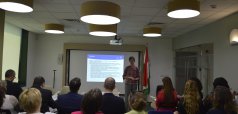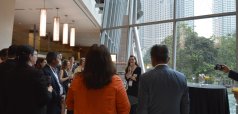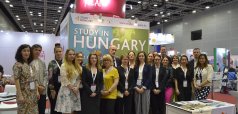Study in Hungary delegation at the 2019 Annual APAIE Conference
08-04-2019
Events | Higher education
From 25 until 29th March, delegation of Study in Hungary had the opportunity to attend the 2019 Annual APAIE Conference in Kuala Lumpur Malaysia, complemented with a forum for the representatives of Hungarian universities and of the diplomatic missions serving in the Southeast and Far East Asia region and finally, a visit to the University of Kuala Lumpur. Besides, Study in Hungary organised a reception for international partner institutions at Kuala Lumpur Convention Centre, which brought together 70 representatives from all over the world.
Study in Hungary delegation members were the representatives of 11 Embassies of Hungary, representatives of 15 Hungarian higher education institutions, representative of the Hungarian Rectors’ Conference, and colleagues of the delegation-leader Tempus Public Foundation.
The Asia-Pacific Association for International Education (APAIE) was established in Seoul, South Korea in 2004 by a Founding Committee consisting of thirteen university representatives from across the Asia Pacific region, and has since expanded to become a thriving association. APAIE aims to encourage greater cooperation between institutions, to enrich and support international programmes, activities and exchanges, and to promote the value of international education across the region and beyond.
APAIE Conference and Exhibition brings together international education policy-makers, practitioners and experts from across the globe to the Asia-Pacific region to network, improve professional skills and learn about new developments in international education.
The APAIE Conference and Exhibition that had debuted in 2006 with 400 delegates, brought together more than 2500 international educators from more than 50 countries in 2019 to review the role of higher education in promoting diversity and inclusivity, expanding capacity to address current and future challenges. It also provided an excellent networking opportunity and set the stage for further cooperation among higher education institutions around the globe. It was the fifth Conference that Study in Hungary initiative has attended.
At the opening ceremony, in her opening speech APAIE president Professor Sarah Todd highlighted among others the significance of acknowledging inclusivity and celebrating diversity to provide the key answer for a better and more peaceful world; eliminating suppression, oppression and depression of any forms.
Apart from Professor Todd, the audience has also been graced by the presence of Her Majesty The Queen of Johor and Deputy Minister of Education, Malaysia. The messages delivered were of one firm tone-acknowledging diversity and valuing inclusivity regardless.
Strolling around the exhibition area visitors could take a look on the national and university booths, among them the Study in Hungary stall, which had attracted many participants to come and have a conversation with us. Streams of visitors began to pour in as early as 8 in the morning until the end of the 3 exhibition days.
Calendars of the representatives of the Hungarian higher education institutions (HEIs) were fully booked; professional discussions, long-awaited personal encounters after emailing, searching for common roads had been made it clear: there is a wide range of possibilities for international cooperation for the Hungarian higher education.
We offered not only meeting opportunities and brochures, but small gifts, and Hungarian embroidery-pattern colouring sheets, so this or that way every visitor had a chance to meet a piece of our culture and values.
This year we had the privilege to welcome the representatives of the diplomatic missions serving in the Asia region, contributing with their knowledge to the professional meetings and discussions.
A Hungarian reception complemented our presence at APAIE, which aim was to open the door to deepen the cooperation with our partner organisations and to support inter-institutional partnership-building in an informal and relaxed setting.
The conference offered enlightening interactive parallel sessions that were great opportunity to exchange experiences and to get to know topics from several perspectives and aspects. Networking lunches were also great events to expand networking.
Study in Hungary team-members participated in several sessions, moreover, TPF had been involved in two sessions and a poster presentation introducing the Hungarian internationalisation methods, learned new information about the changing face of international education, such as about the increasing intensity of competitor destinations and targets in the Pacific area, rise of non-traditional markets (e.g. South Korea that records fourth straight year of strong growth).
We also had a chance to have a look at the trend of the impact of global events throughout real examples.
Field studies demonstrated that when decide where to study, students are influenced by a number of connected educational and lifestyle factors, the connected drivers of choice: such as subject, institution, city, and destination. It was also interesting to overview that how international student hobbies, nationality and broad field of study are connected.
Another way to look at students’ motivation had been shown on a needs-based segmentation: destination-journey; aspiration – recognition.
Did you know what international students want from their studies? According to APAIE lecturers’ studies these factors are: learn about themselves and the world (43%), prepare for their career (43% also), study at a highly ranked university (8%), make a difference in my community (6%).
In another scale: qualification recognised internationally (37%), highest quality course content/best course structure (37%), affordable tuition (16%), easy to meet visa requirements (10%).
Following the 3 days long Conference, Study In Hungary delegation had the privilege to visit UniKL, University of Kuala Lumpur, where Prof. Dato’ Dr. Mazliham Mohd Su’ud, president, CEO gave a welcoming address and overview of the university, followed by a speech and presentation by HE Attila Kali, ambassador of Hungary to Malaysia.
The subsequent discussions between UniKL and Hungarian HEI representatives also promised further fruitful cooperation.
An important topic for Tempus Public Foundation is interntionalisation at home. We could take a look at a few examples of recent national and local campaigns regarding to this issue, such as in the case of Nanyang Technological University (NTU Singapore), where several inbound students services, outbound students’ experience sharing, on campus international experiences ensure the many ways to internalize without going abroad.
On the other hand, Technológico de Monterrey offers Global Faculty Week, student development programs (ambassador program, student interns, youth and leadership program).
Internationalisation is important not only for the higher education institutions, but for companies, too.
Another study showed that what companies need from education institutions: more information about international students, support for language challenges, support in work tasks, support in work guidance. Role of the alumni communities was also highlighted in this topic.
Lauren Moloney-Egnatios, Assistant Director and Intercultural Trainer in the Robertson Center for Intercultural Leadership at UC Berkeley talked about intercultural competencies for 21st century exchange students from the aspect of global competencies inventory and Kolb’s cycle of experiential learning. She shared a few thoughts about their unique initiative, I-House, where engaging with difference is part of the daily experience of living and learning in an international multicultural community.
Last modified: 12-06-2019





















